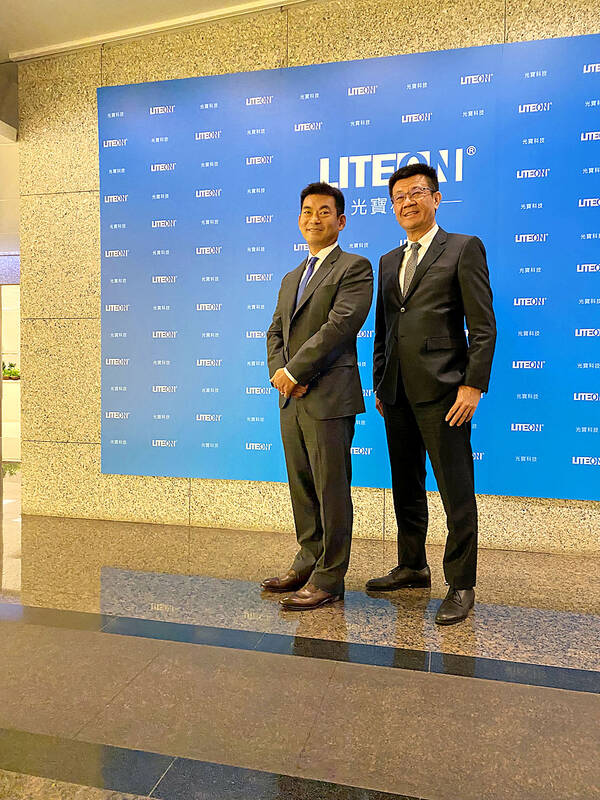Electronic components supplier Lite-On Technology Corp (光寶科技) yesterday reported record profit for the previous quarter, and said it expects growth to extend into this quarter.
Net profit soared 38 percent to NT$4.24 billion (US$132.06 million), compared with NT$3.08 billion in the third quarter last year. On a quarterly basis, net profit expanded 7 percent from NT$3.96 billion.
Earnings per share expanded to NT$1.86, from NT$1.33 per share a year earlier and NT$1.74 in the second quarter.

Photo: CNA
Revenue should continue to grow this quarter after hitting its highest mark in three years at NT$46.17 billion last quarter, Lite-On president Anson Chiu (邱森彬) told an online investors’ conference.
Growth is to be driven by robust demand for higher-margin power management units used in cloud-based data centers, automotive electronics and 5G small-cell stations, Chiu said.
The company’s power management unit for cloud-based data centers is expected to experience its best growth, at about 30 percent annually this quarter, thanks to a broader customer base and market share gains, Chiu said.
Lite-On has gradually expanded its market share to more than 30 percent of the world’s server power supply market this year, he said, adding that the company expects 40 percent next year.
Lite-On has made strides in the electric vehicle (EV) charger market, Chiu said.
The company is scheduled to ship new 3,000-watt charger piles for customers in the US and Europe this quarter, tapping into the high-end commercial vehicle fleet market, he said.
To cope with strong demand for EV chargers and new-generation power supply units used in data centers, Lite-On plans to spend NT$2 billion on new manufacturing capacity at a leased facility in Dallas, Texas, Chiu said.
The expanded manufacturing capacity should contribute NT$10 billion in revenue in 2025, after starting operations in the second quarter of next year, he said.
Lite-On expects automotive electronics to contribute about 10 percent to its revenue next year, up from about 7 percent this year.
With new overseas capacity expansions, Lite-On expects capital spending next year to exceed this year’s budget of NT$5 billion to NT$6 billion.
The company plans to boost capacity in its US and Mexico factories, Chiu said, adding that the capital budget would also be invested on manufacturing equipment automation.

Three experts in the high technology industry have said that US President Donald Trump’s pledge to impose higher tariffs on Taiwanese semiconductors is part of an effort to force Taiwan Semiconductor Manufacturing Co (TSMC, 台積電) to the negotiating table. In a speech to Republicans on Jan. 27, Trump said he intends to impose tariffs on Taiwan to bring chip production to the US. “The incentive is going to be they’re not going to want to pay a 25, 50 or even a 100 percent tax,” he said. Darson Chiu (邱達生), an economics professor at Taichung-based Tunghai University and director-general of

‘LEGACY CHIPS’: Chinese companies have dramatically increased mature chip production capacity, but the West’s drive for secure supply chains offers a lifeline for Taiwan When Powerchip Technology Corp (力晶科技) entered a deal with the eastern Chinese city of Hefei in 2015 to set up a new chip foundry, it hoped the move would help provide better access to the promising Chinese market. However, nine years later, that Chinese foundry, Nexchip Semiconductor Corp (合晶集成), has become one of its biggest rivals in the legacy chip space, leveraging steep discounts after Beijing’s localization call forced Powerchip to give up the once-lucrative business making integrated circuits for Chinese flat panels. Nexchip is among Chinese foundries quickly winning market share in the crucial US$56.3 billion industry of so-called legacy

Taiwan Semiconductor Manufacturing Co (TSMC, 台積電) yesterday held its first board of directors meeting in the US, at which it did not unveil any new US investments despite mounting tariff threats from US President Donald Trump. Trump has threatened to impose 100 percent tariffs on Taiwan-made chips, prompting market speculation that TSMC might consider boosting its chip capacity in the US or ramping up production of advanced chips such as those using a 2-nanometer technology process at its Arizona fabs ahead of schedule. Speculation also swirled that the chipmaker might consider building its own advanced packaging capacity in the US as part

A move by US President Donald Trump to slap a 25 percent tariff on all steel imports is expected to place Taiwan-made steel, which already has a 25 percent tariff, on an equal footing, the Taiwan Steel & Iron Industries Association said yesterday. Speaking with CNA, association chairman Hwang Chien-chih (黃建智) said such an equal footing is expected to boost Taiwan’s competitive edge against other countries in the US market, describing the tariffs as "positive" for Taiwanese steel exporters. On Monday, Trump signed two executive orders imposing the new metal tariffs on imported steel and aluminum with no exceptions and exemptions, effective